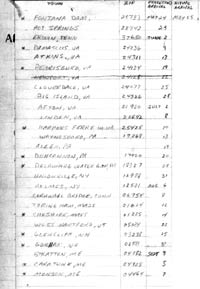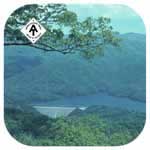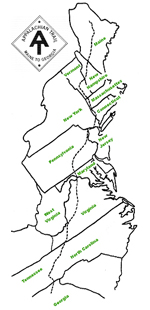|
May 25, Wednesday (1986 miles to go)
Beautiful
this morning, and thankfully no rain last night. We stopped almost
immediately after beginning our hike today to take pictures of the
accumulation of clouds that had all sunk into the valleys around
the Snowbird Mountains during the night and had yet to burn off.
Today would be another fairly short day of about 14 miles to our
next resupply point at Fontana Village before entering the Smoky
Mountains. The trail seemed to be a little long right before Yellow
Creek Road, and then again before Highway 28 before heading into
Fontana Village.
The Village is not directly on the trail. It is located two miles
down the road. We began hiking along the road and had gone at least
half way before we secured a ride from a guy and his two beagles
in a green pickup. He dropped us off at the entrance to the village,
but wouldn't you know there were two entrances, and we got off at
the wrong one. It took a little bit to find the Post Office and
store as a result. I received a lot of goodies from my mother, and
a letter from my friend Dave Szabo. Good to know that someone is
thinking about you. Sent off the two rolls of film that I had shot,
and then went next door to the small store to resupply for the next
leg of our journey. Of course before buying essentials for the
next section, I had to have a pint of Cherry Vanilla ice cream and
two cokes. To help prepare for the next section I consulted
the data book to determine how many days worth of food I would need
to reach the next resupply point in Hot Springs, North Carolina.
The data book has all the major points along the trail listed with
the distance traveled accumulating from one point to the next. It
is helpful for getting a general idea of where you are, how much
farther you have to travel, where the shelters and campsites are,
where the groceries are and how far off the trail you must travel
to get them. I figure how many breakfasts, lunches and dinners are
needed for the next stretch, and then subtract from that the amount
of food that I have left over from the previous section, or from
either packages sent to me. Usually there is no left over food since
hikers tend to eat any extra the last day or so before getting to
town. I then buy only as many breakfasts, lunch, or dinner items
as needed.
After buying your supplies, the ritual of paring down the extra
unnecessary weight of packaging begins. Peanut butter is taken out
of the glass jar and put into a plastic container; all the oatmeal
packets are taken out of the box and put into the food bag. All
items packaged in cardboard are taken out and the cardboard is discarded.
Sometimes the cardboard is used to make a hitching sign to get you
back to the trail. I made a sign that read "DAM" and stood
out by the entrance to the village beside the road leading back
to the trail near the Fontana Dam Shelter. We were almost immediately
picked up by a gift store employee and driven the two miles back
to the shelter.
The Fontana Dam Shelter, also known as the "Fontana Hilton,"
is located about a quarter of a mile from the Dam that serves as
the Tennessee Valley Authoritie's pride and joy and produces electricity
for a large area. At the dam there is a visitors center, public
restrooms, and phone. The best part is that the restrooms have free
heated showers! Jim and I walked down the road to the complex and
alternated using the phone and taking a good lonnnnng shower. I
called home and had a Mountain Dew from the vending machine nearby.
I mentioned to my mom that when sending
raisins, she should send one large box rather than the small
individual packages, talked a bit about sending some more film and
what type to send, and requested she inquire from our neighbor,
a photographer, about how to use a photographic light meter that
I was apparently carrying at this point in the trip. I was interested
in finding out how to correlate the values for different size lenses
since I was carrying my Canon AE-1 camera with it's 55mm lens, a
28mm lens for wide angle shots, and a 135mm lens for zooming in.
The 28 and 135mm lenses were mostly plastic, while the 55mm was
slightly older, but good quality glass and metal. I don't think
I kept the light meter the whole trip, but don't know how long I
waited before I realized I did not need it and sent it home. I found
out that I had received my apartment deposit back from my university
lodging, so the check could be cashed and utilized for either film
developing or something like that. She said she would send off another
package to Erwin, Tennessee if I thought she still had time.
She had already sent one package off today to Hot Springs (cost
$2.49 plus .45 insurance - see
postal receipt). Tomorrow she would send me some more film to
Hot Springs, NC (cost $.95 plus .45 insurance - see
postal receipt) rather than Erwin. I may have been shooting
Ektachrome bulk slide film rolled by yours truly that had been left
over from my journey in 1981. I told her to make sure that whoever
developed the film knew to mark the envelope accordingly and be
sure to save the reusable canisters. I requested Kodachrome 64 slide
film. I think most hikers at this time shot slide film. I had heard
that the image and color quality was far superior to print film
and that most photographers who shot outdoor scenes for magazines
used slide film. Good enough for them - good enough for me.
We
talked for 12 minutes at a cost of $4.67.
I had
set up a tentative maildrop schedule which I had written in my journal
on the page following the front cover. It was not intended to be
adhered to literally, but gave me something to gauge my progress
by. As I reached each maildrop I recorded the actual date I arrived.
Today I was one day behind schedule.
 (click
image for larger view)
(click
image for larger view)
On
our trip back to the shelter, we noticed that "Ford",
the automobile company, was filming some footage for a commercial
for the '84 LTD on the road between the shelter and the visitor
complex. They kept driving back and forth in an attempt to get it
"just right." Ate Sweet Sue chicken and dumplin's from
a can for supper, and brownies for dessert. The meals immediately
after resupply are always the best as they can be just about anything
rather than dehydrated or "just add water" type meals.
Even though this meal came from a can it was delicious. Almost as
good as grandma's dumplin's! With numerous trash cans nearby, the
refuse can also be discarded rather than being carried around for
days.
Gonzo!
Appalachian Trail Journals ©1983
|




